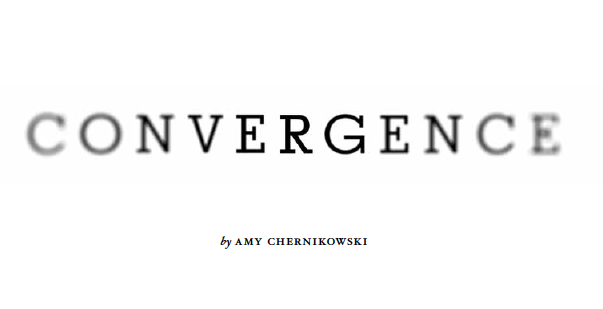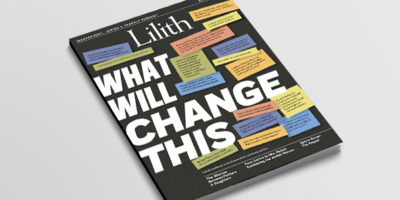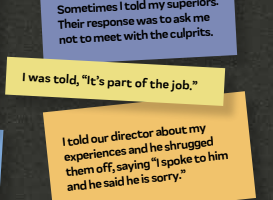
Convergence
Vengeance and forgiveness are about reconciling the accounts, but accounting is an ugly description of the tangled ways we’re connected. I sometimes think everything comes out even in the end, but an end that arches beyond the horizon, beyond our capacity to perceive or measure, and that in many ways those who trespass against you do so out of a misery that means the punishment preceded and even precipitated the crime.
—Rebecca Solnit, The Faraway Nearby
My brother and I privately called Aunt Gail “The Cyclops” because neither eye made contact and so she was always talking over our heads or to the wall. It didn’t occur to us—or to me, at least—that I was a Cyclops too.
I was going to vision therapy for my strabismus, doing my homework: “trombones” every time I sat on the toilet, just so that I’d remember, focusing on my index finger, following it out and back in again, push-ups for my eye muscles. I also did something called convergence therapy, which, in the early 1980s, anyway, meant focusing on two sets of concentric circles on an index card and using your eye muscles to bring them together and move them apart.
I remember sitting in the car, on our way to Aunt Gail and Uncle Doug’s house. We weren’t really going to visit them, I realized, even then, but my grandparents had moved in with them when they couldn’t live on their own anymore, and so there was no avoiding it.
“Don’t sit and play on their living room carpet,” said my mother, over her shoulder, to us. “It’s probably covered in dog semen,” she muttered to my father. He chuckled in the driver’s seat beside her. I could tell from his restrained laugh that it was something we weren’t supposed to know about and shouldn’t ask, but I knew it was important so I remembered that word, the power of it. Semen.
Aunt Gail and Uncle Doug had a big smelly dog that did this thing they called “swimming.” He would drag himself across the carpet on his belly, legs splayed out and rear end bobbing up and down. Uncle Doug would clap his hands twice and say, “Swim, Rudy!” and he and Gail and my cousins would howl like it was the funniest thing ever.
My mother, sitting across from me on the couch, would look at me knowingly while Rudy humped his way across the room. See? I told you so. And I was invited to participate in her disgust at this thing, whatever it was. Her disgust always seemed to be something that I was supposed to see, not so much my brother or even my father. There was an urgent message in there for me to decode.
Blacksmiths used to wear an eyepatch over one of their eyes for protection while they worked. In case of misfortune, they would be left with one good eye. This may be where the giant single eye of the Cyclops comes from, since, according to legend, the Cyclopes worked as blacksmiths, and they constructed great Cyclopean walls.
Untreated strabismus often results in amblyopia, which is what happens when the brain, feeling uncomfortable receiving two conflicting images, decides to ignore the information coming in from one of the eyes. This is likely what happened to my aunt’s vision. My daughter has another version of this condition, called alternating amblyopia, which means that her brain is constantly swapping out images so that she has a strobe light of information coming in from both eyes but not quite at the same time. My own eyes are aligned enough most of the time so that the information is never canceled out but it takes a lot of muscle to get a unified picture; when I’m tired, I get double vision.
Aunt Gail was 10 years older than my mother, and when she married at 18 she and Uncle Doug moved into my grandparents’ basement. I wonder if Gail felt that she had to marry Doug because of the social consequences of her severe strabismus and neglected teeth. Maybe my grandparents thought that 25-year-old Doug was a real catch, because when it became apparent that he was more interested in my adolescent mother than he was in his wife, my grandmother responded to my mother’s distress with, “Oh, he’s just flirting with you honey, ignore it and he will stop.”
A few years later, when my grandfather caught Doug in the act, Aunt Gail said, “don’t ever tell my kids.” That was all.
From the time I was around 11, it was my job to clean the bathrooms. I remember my dad telling me that I didn’t have to be so thorough, but I liked to work slowly and make everything shine.
One day, I was in my parents’ bathroom, flossing the faucets with a cloth, when my mother called me over to sit beside her on the bed. She had a small stack of magazines she wanted to show me.
“This is what your father likes to look at,” she said, turning the pages slowly, watching my face for a reaction. I remember seeing a woman in short jean cutoffs. She was kneeling, pushing her shorts and panties aside with her fingers, holding her labia open so that her clitoris was sticking out, but I didn’t know the names for these things back then.
“Does your father ever look at you like this?” she asked.
“No,” I said.
“What about your brother?”
“No.” I got up and went back to cleaning the bathroom. There was a dark curly hair stuck to the top of the soap and I left it there.
I have often thought of my strabismus as having each of my eyes focused on different points of the horizon, scanning for predators, like a deer, whereas Aunt Gail is wearing an eyepatch, like a blacksmith, building a wall.
When I was pregnant with my youngest daughter, I told my parents, “If it’s a boy, we might not circumcise.”“That’s fine, I’ll just do it when I’m babysitting,” said my dad.
“Then you won’t be babysitting,” I said.
“But it’s part of the covenant,” he said.
“Ah, now we’re getting somewhere,” I said. “How’s that bacon sandwich?”
He laughed and said, “You’re deflecting. That part is non-negotiable, and you know it.”
I shrugged. What do you say to that? “I’m sure God’s got more around to be offended by than a little bit of skin. God likes skin! That’s why he gives boys some extra.” I said.
In my mother’s gestures, her disgust always seemed to be something that I was supposed to see —not so much my brother, or even my father. There was an urgent message in there for me to decode.
“Your grandfather will be rolling in his grave,” he said.
“The baby will look just like a little dog,” said my mother, going in for the kill, making her famous Uncle Doug-jerking-off face.
And that decided it for me, the jerk-off face, the power her slight gesture has over me, to be able to conjure up decades of disgust with a quick look. I couldn’t refuse to circumcise the baby, I would be making the baby like Uncle Doug.
It was always easy for her to manipulate my thoughts. All she needed to do was to make a slight move with her hand, or even a quick facial expression, and I would know what she meant by that; it was Uncle Doug masturbating when we walked past a sexy advertisement, or Uncle Doug masturbating when one of my cousins wore something too tight to the Christmas party. And so my imagination was hijacked by Uncle Doug masturbating and also my mother miming Uncle Doug, my mother’s face and his melding like one of those photographs of couples looking similar, their faces melting into each other between their separate portraits, like those concentric circles I spent my youth staring into convergence.
Uncle Doug has been dead for 10 years. My mother always said she would “get even” with him someday but it’s too late now. I always wanted to get even with him for her but it always came out wrong; so much of my anger was directed at the wrong person.
When my mom, at age 20, told her family that she was engaged to my dad, they stopped talking to her for a year. I don’t know what this means; it doesn’t sound like they ever talked much. They didn’t like that she was marrying a Jewish guy and they liked it even less that she was converting. They didn’t understand what that meant and thought they’d have to start calling her by her new Hebrew name, Ruth.
My mother’s family decided that she thought she was too good for them, that was their version of the story. Maybe it really did seem like that to them because we had all our dental work done, and I had vision therapy too.
When I was sleeping in a separate bed with my youngest baby, and our two-year-old would get up during the night and climb into bed with my husband, I would sometimes hear my mom’s voice in my head, “Do you really think that’s appropriate? You know what happens to men’s bodies while they’re sleeping,” and I would check in, just to make sure everyone is comfortable, I’d tell myself.
I would always find my husband sleeping with our daughter’s feet in his face, her body stretched out horizontally across the pillows, because she had gone to sleep kicking him in the head, as she always did, and as I lay down again with our baby I would think, Someone should have to pay for all this and it shouldn’t be my mom or my dad or my husband or me, either, and it should most definitely not be my daughters. But someone should have to pay.
When I was young, I didn’t know how to think about this sort of thing. Without enough vocabulary, thinking is impossible. I just wished it away, and it wouldn’t go.
Rebecca Solnit says that forgiveness is very much a public act, but the internal feeling of forgiving is something else, like listening to a radio station while you’re driving out of range. The signal gets fuzzier and fuzzier and eventually disappears. One day, you realize that what you have is the absence of something unpleasant.
My dad’s view on forgiveness is sure, forgiveness is nice to talk about, but you’re Jewish, so you should know that there are some things you don’t do in the first place. Not that Jews are always so good at remembering that, he would probably want me to add.
There is a 25 percent chance of strabismus, being inherited. I would like to sever that tie now that I have the vocabulary, for myself and especially for my daughters. These days, you would barely even know that I have it, with my muscle strength from doing trombones every day for years and making those circles, little worlds on the cards, come together and move apart, like splitting up a Venn diagram:
THIS IS WHO YOU ARE THIS IS WHO I AM THAT IS WHERE SHE CAME FROM
The author has chosen to publish this essay under the surname “Chernikowski,” a name from her family’s past generations, to protect her family’s identity. Her fiction and non-fiction have appeared in several Canadian magazines. She can be found on Twitter: @AmyChernikowski.



